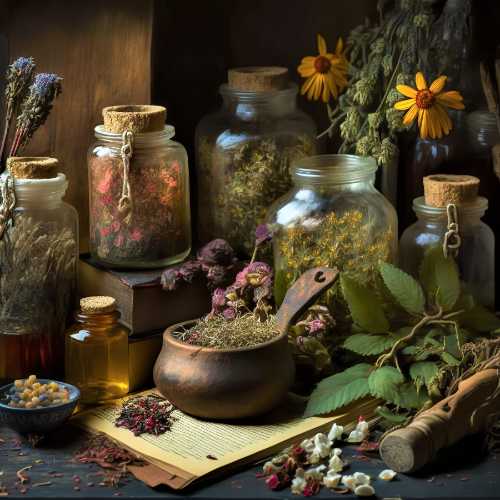ZOOPHARMACOGNOSY (Zoo = Animal, Pharma = drug, Cognosy = knowing), commonly known as Self-Selection, is the term used for this innate ability animals have to recognize which medicinal plants they need.
When a medicinal plant is required by an animal for its therapeutic properties it will taste sweet and palatable. If the animal is healthy the same plant will taste bitter, deterring consumption, and therefore stopping the animal from eating it. This prevents over eating of nature’s pharmacy ensuring nature always has a supply of medicinal plants.
Zoopharmacognosy is not new, in fact it is the oldest therapy in existence. At one time the only medicine available was what nature provided and many conventional drugs used today, for both animals and humans, are still based on medicinal plants.
In the wild horses will roam across vast areas of land. If they become unwell they will seek out specific plants, herbs, essential oils, algae, clay and other natural remedies, not in their normal diet, to restore themselves back to good health.
Horses will always prefer hay that is high in sugar content to one that is low in sugar. In the pasture they will prefer plants infected with endophytes (they obviously taste better, despite endophytes being toxic for horses in larger amounts). Some horses will eat anything, even poisonous plants. Eating poisonous plants can sometimes indicate that the horse has a metabolic issue.
Some herbs cannot be given when horses are on a certain medication.
Some herbs are illegal in sports, some herbs can be harmful when used long term and some herbs should not be given to horses that already have a metabolic issue.
HOW REMEDIES ARE SELECTED
As Herbs, Essential Oils and Aromatics are pure natural herbal remedies, mother natures answer to pharmaceutical drugs, animals are instinctively able to recognise the medicinal properties of the Natural remedies being offered and select the ones appropriate to their needs: emotionally, psychologicaly and physically.
TYPES OF REMEDIES USED
Herbs
Herbs that are safe for horses include:
Dandelion – A nutritious plant that contains many vitamins and can be eaten raw or cooked. The roots can help increase urine flow.
Echinacea – The root, leaves, stems, and flowers can help reduce inflammation, relieve pain, and kill bacteria and viruses. Echinacea extract can also help with blood cell function.
Stinging nettle – A well-known herb that can help with pollen allergies. It contains many minerals, including silicon.
Chamomile – Can be fed to horses before competition to help ease nerves without affecting performance.
Garlic – Has expectorant and antibiotic properties that can help with respiratory tract irritation.
Comfrey – Can help heal damaged bones, reduce the effects of arthritis, and relieve tendon strains. It may also help with the respiratory system.
Fenugreek – A digestive tonic that can boost appetite and help the body use nutrients more effectively.
Other herbs that are safe for horses include:
- Calendula
- Plantain leaf
- Peppermint leaf
- Parsley leaf
- Marshmallow leaf
- Lemon balm
Mother Nature has provided a wonderful bounty of non-food remedies. Applied Zoopharmacognosy or Self-selection works with the principles of giving back to animals these remedies that would be similar in their chemical make-up to those that they would seek in the wild. These also include:
• Essential oils
• Absolutes
• CO2 extracts
• Macerated oils
• Clays and muds
• Spirulina
• Seaweed/Kelp
• Grasses
Ways to offer the selections
This requires some time and patience, and can be a bit messy but is very rewarding. If you choose this method ensure you:
- Choose a quiet time of the day so you can both focus on the task in hand.
- Ensure fresh water is available at all times.
- Ensure your horse isn’t hungry – offer hay at the same time, or carry out in the filed.
- Mix powders with a small amount of water.
- Make notes of the herbs selected for future reference.
How to offer dried herbs
You can either do this by hand, or by placing some in feed bowls on the floor and allowing them to select, offer a small amounts of each herb at the same time.
Water buffet style – Fill your tubtrugs with water and then add a couple of scoopfuls of your chosen herb to each trug. Don’t worry about giving too much or too little as the horses will adapt to the strength you give them.

